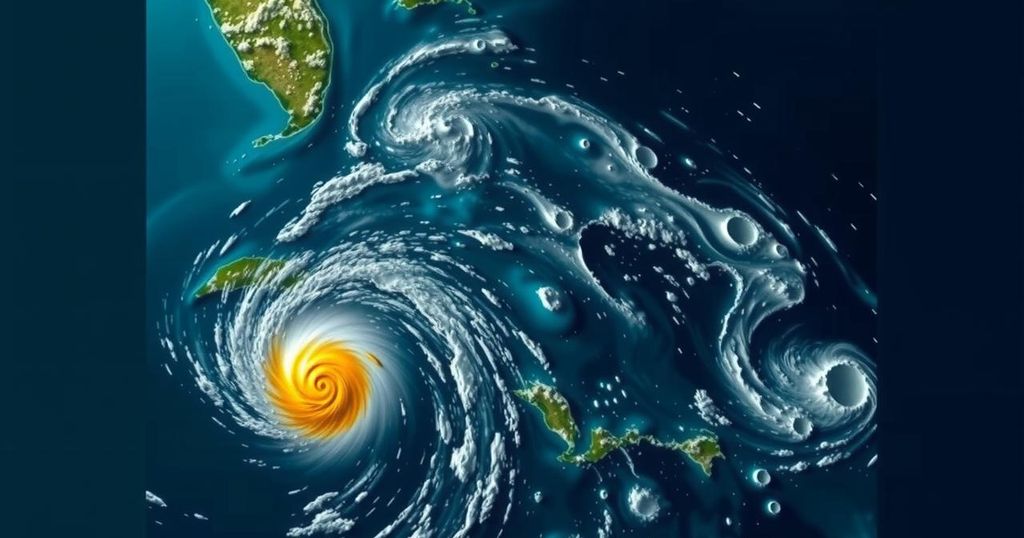Cuba Faces Extended Blackouts As Hurricane Oscar Approaches
Cuba endures a third consecutive day without electricity as Hurricane Oscar approaches, leading to widespread frustrations over the failing energy grid. With most of the country’s population affected, the crisis is exacerbated by the storm, which may bring further complications for recovery efforts. Officials cite U.S. sanctions and infrastructure issues as critical factors in the ongoing energy crisis.
As Hurricane Oscar approaches Cuba, millions of residents remain without electricity for the third consecutive day. The situation has worsened after efforts to restore power failed due to the aging infrastructure of the energy grid. According to the Cuban Electrical Union, only about 16% of the population had experienced a restoration of power, only for the grid to suffer another failure late Saturday. This incident marks the third total collapse of the energy grid since Friday. Power outages have affected nearly all of Cuba’s ten million residents continuously since the crisis began, leading to a significant disruption in daily life, including access to water and food preservation. The impending Hurricane Oscar is exacerbating the difficulties faced by recovery efforts, with the storm expected to hit Cuba’s northeastern coast later today, potentially bringing strong winds and dangerous surf conditions. Hurricane Oscar, which made its initial landfall in the Bahamas with winds reaching 80 mph, could weaken after hitting Cuba but may still remain a tropical storm as it moves north on Monday. The first island-wide blackout occurred on Friday due to a power plant failure. Subsequent efforts to restore power were met with further outages, adding to the challenges that the Cuban population faces. In Havana, the dire situation has prompted residents to share information about which neighborhoods still have electricity and to collaborate on storing essential items like medications. Long queues have formed at bread stores, and frustrations have grown as supplies dwindle. Amidst this, citizens are questioning the absence of support from Cuba’s traditional allies, such as Venezuela, Russia, and Mexico, who have previously provided vital oil deliveries to support the nation’s energy needs. Tourists in Havana have reported hotels struggling to maintain services, with international flights also affected as the José Martí International Airport operates on emergency power. While chaos unfolds in the streets with reports of sporadic protests, government officials cite a combination of U.S. economic sanctions, recent hurricanes, and the island’s deteriorating infrastructure as contributing factors to this ongoing energy crisis. Cuban Prime Minister Manuel Marrero Cruz acknowledged the severity of the situation in a recent televised address, stating, “We have been paralyzing economic activity to generate (power) to the population.” Meanwhile, health facilities continue to operate on backup power systems to ensure that essential services are maintained.
Cuba has been experiencing significant challenges with its aging energy infrastructure, which has resulted in frequent power outages across the nation. These blackouts not only affect daily life but also jeopardize public health and food supplies, creating a broader humanitarian concern. The situation has been compounded by external factors such as U.S. sanctions and environmental impacts from hurricanes in the region. The arrival of Hurricane Oscar poses an additional threat to recovery efforts and the stability of power across the island, highlighting the vulnerabilities of Cuba’s infrastructure and economy.
In summary, the situation in Cuba is increasingly critical as millions remain without power while Hurricane Oscar approaches. With the energy grid failing multiple times and significant societal frustrations rising, the Cuban government faces mounting pressure to stabilize the energy crisis. The challenges are intensified by natural disasters and the effects of sanctions, emphasizing the urgent need for a sustainable solution to restore power and ensure public safety.
Original Source: www.cnn.com




Post Comment